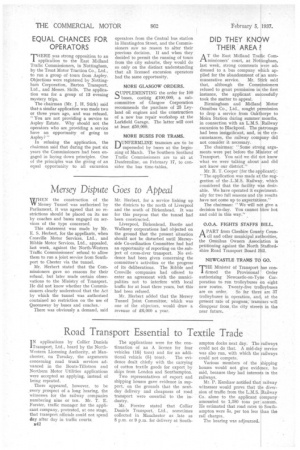Road Transport Essential to Textile Trade
Page 56

If you've noticed an error in this article please click here to report it so we can fix it.
I N applications by Collier Daniels Transport, Ltd., heard by the NorthWestern Licensing Authority, at Manchester, on Tuesday, the arguments concerning road trunk services advanced in the Bouts-Tillotson and Northern Motor Utilities applications were accepted as applying, instead of being repeated.
There appeared, however, to be .every prospect of a long hearing, the witnesses for the railway companies numbering nine or ten. Mr. T. E. Forster, traffic manager for the applicant company, protested, at one stage, that transport.officials•could not spend day after day in traffic courts.
s42 The applications were for the continuation of an A licence for four vehicles (16i tons) and for an addi
tional vehicle (Si tons). The evidence dealt chiefly with the carrying of cotton textile goods for export by ships from London and Southampton.
Two representatives of export and shipping houses gave evidence in support, on the grounds that the nextday delivery and cheapness of road transport were essential to the industry.
Mr. Forster stated that Collier Daniels Transport, Ltd., sometimes collected in Manchester as late as 8 p.m. or 9 p.m. for delivery at South ampton docks next day. The railways could not do that. A mid-da service was also run, with which the railways could not compete.
Various members of the hipping houses would not give evid nce, he said, because they had interests in the railways. Mr. P. Kershaw notified thai] railway witnesses would prove that tle diversion of traffic from the L.M.S. Railway Co. alone to the applicant clompany amounted to 1,380 tons per annum. He estimated that road rates t Southampton were Ss. per ton less than the rail charges.
The hearing was adjourned.




























































































